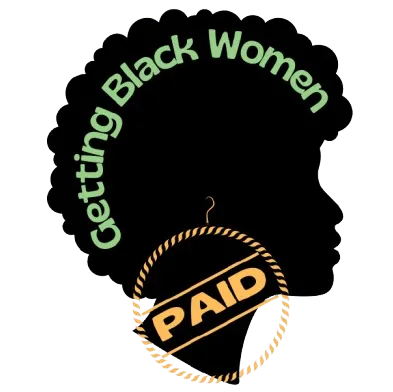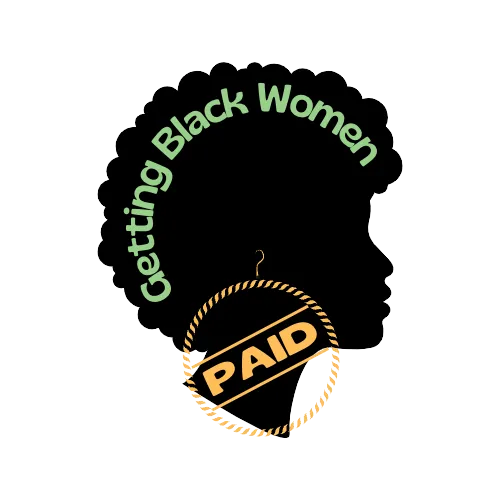
Getting Black Women Paid Blog

The Getting Black Women Paid Podcast
Blog Posts.

Why Black Women Are Leaving Corporate America
Why Black Women Are Leaving Corporate America and Building Their Own Futures
Originally published on LinkedIn
Corporate America has long been a challenging space for Black women. From being underpaid and underrepresented in leadership to enduring microaggressions and systemic inequities, many of us find ourselves in workplaces where our contributions are undervalued and our presence is overlooked. Yet, even against these odds, we’ve persisted—leading, excelling, and holding up industries that would crumble without our labor.
But something has shifted. With the rollback of DEI initiatives, the 2024 election of leaders hostile to progress, and the ever-present realities of workplace bias, Black women are facing a hard truth: the systems we’ve invested so much in were never designed for us.
So, what happens when the most overqualified group in the workforce decides to stop playing a rigged game? We build our own tables.
This article explores the growing exodus of Black women from Corporate America, how systemic failures are driving us to entrepreneurship, and the resilience, ingenuity, and community-building shaping this new era.
The Decline of DEI and the Broken Promise of Inclusion
Corporate America is undergoing a significant shift away from workplace equity. DEI programs—many of which were already underfunded—are being rolled back entirely, signaling that past commitments to diversity were merely performative. Black women are experiencing greater workplace isolation, fewer sponsorship opportunities, and a resurgence of unchecked bias.
The elimination of DEI roles and initiatives has also led to the decline of employee resource groups (ERGs) and mentorship programs—critical support systems for Black professionals. Without these efforts, we are left to navigate workspaces that feel increasingly unwelcoming.
With fewer corporate safeguards in place, the risks of workplace discrimination and pay disparities worsening are higher than ever. Many Black women now face a choice: continue fighting for inclusion in an environment that deprioritizes equity, or seek opportunities where they can thrive on their own terms.
Recognizing this shift, the NAACP recently issued a spending guide urging Black Americans to divest from companies that have walked back their DEI commitments. This initiative highlights a growing awareness that economic power must be leveraged strategically—redirecting dollars away from corporations that fail to support Black employees and reinvesting in businesses that prioritize equity.
This push for economic self-determination aligns with a broader movement: rather than waiting for companies to act in good faith, Black professionals are choosing to build their own opportunities.
Political Disenfranchisement & the Shift Toward Self-Reliance
The 2024 election reinforced what many Black women already knew—those in power are not coming to save us.
Despite being a driving force in voter mobilization and social justice efforts, Black women continue to see our concerns ignored by political leaders. Policies that once attempted to level the playing field are being dismantled, while new restrictions on voting rights and social protections further limit economic and professional mobility.
For too long, we have been expected to work harder, advocate louder, and remain patient for a system that continues to overlook us. Now, there is a growing awareness that real change is unlikely to come from those who benefit from the status quo.
Rather than waiting for fair pay, promotions, or financial security, Black women are taking ownership of their futures—launching businesses, investing in real estate and stocks, expanding financial literacy, and embracing digital entrepreneurship to secure long-term wealth.
This shift isn’t just about survival—it’s about power, freedom, and ownership.
The Exodus to Entrepreneurship
Why Black Women Are Choosing Entrepreneurship
Entrepreneurship offers something that Corporate America has repeatedly failed to provide: control. It allows Black women to create businesses that reflect their values, serve their communities, and provide financial freedom.
Instead of being forced into industries that undervalue our labor, we are building our own. Instead of chasing promotions that never come, we are setting our own rates. Instead of fighting for a seat at the table, we are owning the table.
Beyond financial empowerment, Black women entrepreneurs are creating culturally relevant businesses, developing solutions for our own communities, and breaking barriers in industries that have long excluded us. The collective success of Black women in business is reshaping the landscape of economic power.
Challenges of Entrepreneurship & the Power of Community
Of course, the transition to entrepreneurship isn’t without its challenges. Black women entrepreneurs face systemic financial barriers, including lack of access to capital, limited mentorship, and difficulty breaking into networks that drive business success.
However, where traditional business structures have failed us, we have built our own.
Through mentorship programs, funding circles, and digital communities, Black women are creating alternative pathways to success. Cooperative economics, social media visibility, and collective knowledge-sharing are making entrepreneurship more accessible than ever before.
By fostering strong networks, we are not just building businesses—we are building ecosystems of success that challenge traditional power structures.
A Call to Action
To Black Women: Keep Building
The road may be filled with obstacles, but Black women are not new to overcoming them. The current political and economic climate may be discouraging, but history has shown that we are not only survivors—we are builders, leaders, and changemakers.
If you are navigating entrepreneurship, scaling your business, or pivoting in a new direction, trust that your work is valuable and your vision is necessary. Seek out mentorship, build relationships with like-minded entrepreneurs, and embrace the strength of community.
We are our own safety net. We are our own advocates. We are our own solution.
To Allies: Support Can’t Be Performative
Real support means more than performative allyship. It means investing in Black-owned businesses, advocating for equitable access to resources, and amplifying the voices of Black women entrepreneurs. It means creating meaningful opportunities for mentorship, funding, and collaboration.
Success is rarely achieved alone. If you are in a position to help, do so with intentionality.
Conclusion: The Future Is Ours to Build
Black women have always been the backbone of industries, communities, and movements. But as the workplace continues to deprioritize our needs, we are choosing to invest in something greater—ourselves.
This movement is not just about leaving corporate spaces that fail to support us. It is about creating something better—a future where Black women define success on our own terms.
Through entrepreneurship, financial independence, and community-building, we are proving that we don’t need permission to thrive.
While challenges remain, one thing is certain: Black women are not waiting for change. We are creating it.

Why Black Women Are Leaving Corporate America
Why Black Women Are Leaving Corporate America and Building Their Own Futures
Originally published on LinkedIn
Corporate America has long been a challenging space for Black women. From being underpaid and underrepresented in leadership to enduring microaggressions and systemic inequities, many of us find ourselves in workplaces where our contributions are undervalued and our presence is overlooked. Yet, even against these odds, we’ve persisted—leading, excelling, and holding up industries that would crumble without our labor.
But something has shifted. With the rollback of DEI initiatives, the 2024 election of leaders hostile to progress, and the ever-present realities of workplace bias, Black women are facing a hard truth: the systems we’ve invested so much in were never designed for us.
So, what happens when the most overqualified group in the workforce decides to stop playing a rigged game? We build our own tables.
This article explores the growing exodus of Black women from Corporate America, how systemic failures are driving us to entrepreneurship, and the resilience, ingenuity, and community-building shaping this new era.
The Decline of DEI and the Broken Promise of Inclusion
Corporate America is undergoing a significant shift away from workplace equity. DEI programs—many of which were already underfunded—are being rolled back entirely, signaling that past commitments to diversity were merely performative. Black women are experiencing greater workplace isolation, fewer sponsorship opportunities, and a resurgence of unchecked bias.
The elimination of DEI roles and initiatives has also led to the decline of employee resource groups (ERGs) and mentorship programs—critical support systems for Black professionals. Without these efforts, we are left to navigate workspaces that feel increasingly unwelcoming.
With fewer corporate safeguards in place, the risks of workplace discrimination and pay disparities worsening are higher than ever. Many Black women now face a choice: continue fighting for inclusion in an environment that deprioritizes equity, or seek opportunities where they can thrive on their own terms.
Recognizing this shift, the NAACP recently issued a spending guide urging Black Americans to divest from companies that have walked back their DEI commitments. This initiative highlights a growing awareness that economic power must be leveraged strategically—redirecting dollars away from corporations that fail to support Black employees and reinvesting in businesses that prioritize equity.
This push for economic self-determination aligns with a broader movement: rather than waiting for companies to act in good faith, Black professionals are choosing to build their own opportunities.
Political Disenfranchisement & the Shift Toward Self-Reliance
The 2024 election reinforced what many Black women already knew—those in power are not coming to save us.
Despite being a driving force in voter mobilization and social justice efforts, Black women continue to see our concerns ignored by political leaders. Policies that once attempted to level the playing field are being dismantled, while new restrictions on voting rights and social protections further limit economic and professional mobility.
For too long, we have been expected to work harder, advocate louder, and remain patient for a system that continues to overlook us. Now, there is a growing awareness that real change is unlikely to come from those who benefit from the status quo.
Rather than waiting for fair pay, promotions, or financial security, Black women are taking ownership of their futures—launching businesses, investing in real estate and stocks, expanding financial literacy, and embracing digital entrepreneurship to secure long-term wealth.
This shift isn’t just about survival—it’s about power, freedom, and ownership.
The Exodus to Entrepreneurship
Why Black Women Are Choosing Entrepreneurship
Entrepreneurship offers something that Corporate America has repeatedly failed to provide: control. It allows Black women to create businesses that reflect their values, serve their communities, and provide financial freedom.
Instead of being forced into industries that undervalue our labor, we are building our own. Instead of chasing promotions that never come, we are setting our own rates. Instead of fighting for a seat at the table, we are owning the table.
Beyond financial empowerment, Black women entrepreneurs are creating culturally relevant businesses, developing solutions for our own communities, and breaking barriers in industries that have long excluded us. The collective success of Black women in business is reshaping the landscape of economic power.
Challenges of Entrepreneurship & the Power of Community
Of course, the transition to entrepreneurship isn’t without its challenges. Black women entrepreneurs face systemic financial barriers, including lack of access to capital, limited mentorship, and difficulty breaking into networks that drive business success.
However, where traditional business structures have failed us, we have built our own.
Through mentorship programs, funding circles, and digital communities, Black women are creating alternative pathways to success. Cooperative economics, social media visibility, and collective knowledge-sharing are making entrepreneurship more accessible than ever before.
By fostering strong networks, we are not just building businesses—we are building ecosystems of success that challenge traditional power structures.
A Call to Action
To Black Women: Keep Building
The road may be filled with obstacles, but Black women are not new to overcoming them. The current political and economic climate may be discouraging, but history has shown that we are not only survivors—we are builders, leaders, and changemakers.
If you are navigating entrepreneurship, scaling your business, or pivoting in a new direction, trust that your work is valuable and your vision is necessary. Seek out mentorship, build relationships with like-minded entrepreneurs, and embrace the strength of community.
We are our own safety net. We are our own advocates. We are our own solution.
To Allies: Support Can’t Be Performative
Real support means more than performative allyship. It means investing in Black-owned businesses, advocating for equitable access to resources, and amplifying the voices of Black women entrepreneurs. It means creating meaningful opportunities for mentorship, funding, and collaboration.
Success is rarely achieved alone. If you are in a position to help, do so with intentionality.
Conclusion: The Future Is Ours to Build
Black women have always been the backbone of industries, communities, and movements. But as the workplace continues to deprioritize our needs, we are choosing to invest in something greater—ourselves.
This movement is not just about leaving corporate spaces that fail to support us. It is about creating something better—a future where Black women define success on our own terms.
Through entrepreneurship, financial independence, and community-building, we are proving that we don’t need permission to thrive.
While challenges remain, one thing is certain: Black women are not waiting for change. We are creating it.
Earn the Salary You Deserve
Book your Salary You Deserve Strategy Session today!
Investment: $97
Getting Black Women Paid
Location
P.O. Box 705
Forest Park, IL 60130
Let's Connect!
For weekly strategies, insights, and inspiration, sign up for the Claim Yours Newsletter.
Getting Black Women Paid
Location
Contact
Follow
